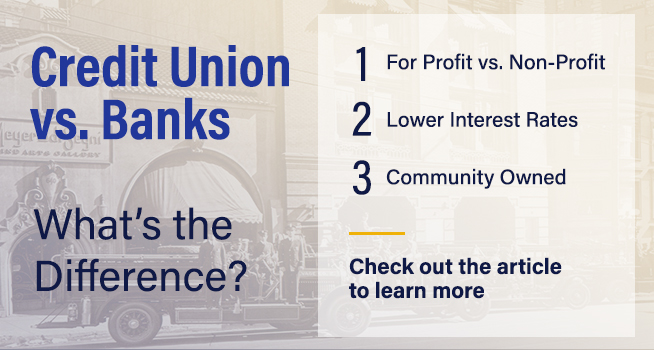A Credit Union's or a Bank?
What’s the Difference?

When looking for a financial institution, the two main options are banks or credit unions. The financial institution that is right for you depends on the products and services you need. Although banks and credit unions have offerings and conveniences that are very similar, there are some important differences.
For-Profit vs. Non-Profit
One of the biggest differences between banks and credit unions is their profit status.
Banks
Banks are for-profit institutions that are owned by investors or are publicly traded. Customers do not have a vote or a say in how a bank is run. A bank’s primary goal is to turn a profit, rather than focus on the needs of the account holders.
Credit Unions
Credit Unions are owned by their members and are typically set up with membership being available to a group of individuals who share a common bond or location. For example, Firefighters First Credit Union exclusively offers financial products and services to Firefighters nationwide. A credit union's mission is to provide it's members with the best terms it can afford while also using all earnings to improve the business and the quality of life of it's members and their communities.
These differences are the main reasons why most banks charge more fees and have higher rates than credit unions do.
Products and Services
Banks and credit unions offer many of the same products and services such as checking accounts, savings accounts, home loans, credit cards, personal loans, and online banking services. Traditionally, if you are looking for more advanced offerings like wealth management or financial planning services, you would often need to be a customer of a bank and a member of a credit union. However, Firefighters First Credit Union offers these services, which allows you to keep all your accounts under one roof if you qualify for membership.
Interest Rates
Interest rates are another big differentiating factor between banks and credit unions. Where banks are for-profit institutions, interest rates are typically higher on all financial products. Credit unions are non-profit organizations with a goal of providing the lowest rates possible to their members. The differences in interest rates can often be extreme so if you are looking for a low-rate loan product or credit card it is often best to contact your credit union.
Online and Mobile Banking
In the past, the convenience of online and mobile banking products was not widely available. Today almost every financial institution has online and mobile banking systems that allow you to bank from almost anywhere. Online & mobile services vary in their capabilities, so it is best to investigate the technology if it is a deciding factor on where you choose to manage your money. Some important options to look out for are...
- Online Wire Transfers
- Mobile Check Deposit
- Online Internal Transfers
- Shared Branching
- Online External Transfers
- Online Card Management
These features can make all the difference in your online and mobile banking convenience.
Federal Deposit Insurance Corporation (FDIC) vs. National Credit Union Association (NCUA)
Individuals who use banks are protected by FDIC Insurance. Credit unions carry very similar NCUA insurance. So, what’s the difference?
The FDIC is a government agency that provides deposit insurance for banks for each depositor up to $250,000 if your bank were to fail or run out of money. The FDIC also examines and supervises financial institutions for safety, consumer protection, and soundness. Not all institutions are eligible for insurance from the FDIC so it's always best to double check using the FDIC Bank Checker Tool.
The NCUA is an independent federal agency that supports and regulates federal credit unions and federally insured state credit unions across the U.S. Just like FDIC insurance, NCUA insurance provides $250,000 of coverage per depositor should the credit union close. All federal credit unions and most state credit unions are insured by the NCUA. If you are unsure if your credit union is insured, you can always check using the NCUA’s Credit Union Locator Tool.
What’s the Right Choice for You?
Even though banks and credit unions offer very similar products and services, they are fundamentally different in two ways. Large banks typically have more brick-and-mortar locations nationwide, so if you value more face-to-face interaction, they may be your best choice. Credit unions and banks also differ in their profit status. Banks are owned by investors or are publicly traded, and credit unions are non-profit institutions that put all the money they earn outside of operating expenses into improvements for member satisfaction or back into their respective communities.
Deciding on a bank or credit union comes down to what you value most. If you value face-to-face interaction and do not live in the proximity of a credit union, you may prefer a bank. If you value better rates, customer service, and the knowledge that their goal is to support their communities, a credit union is the better choice.
If you are a Firefighter looking for a credit union, Firefighters First is the largest credit union in the U.S. exclusively serving the Fire Family. Firefighters First Credit Union offers specialized products, firefighter-specific knowledge, and services to meet your unique lifestyle.
Firefighters First Credit Union's mission is to improve the financial lives of the Fire Family. To learn more about Firefighters First Credit Union, visit https://firefightersfirstcu.org/ or give us a call at 800-231-1626.
